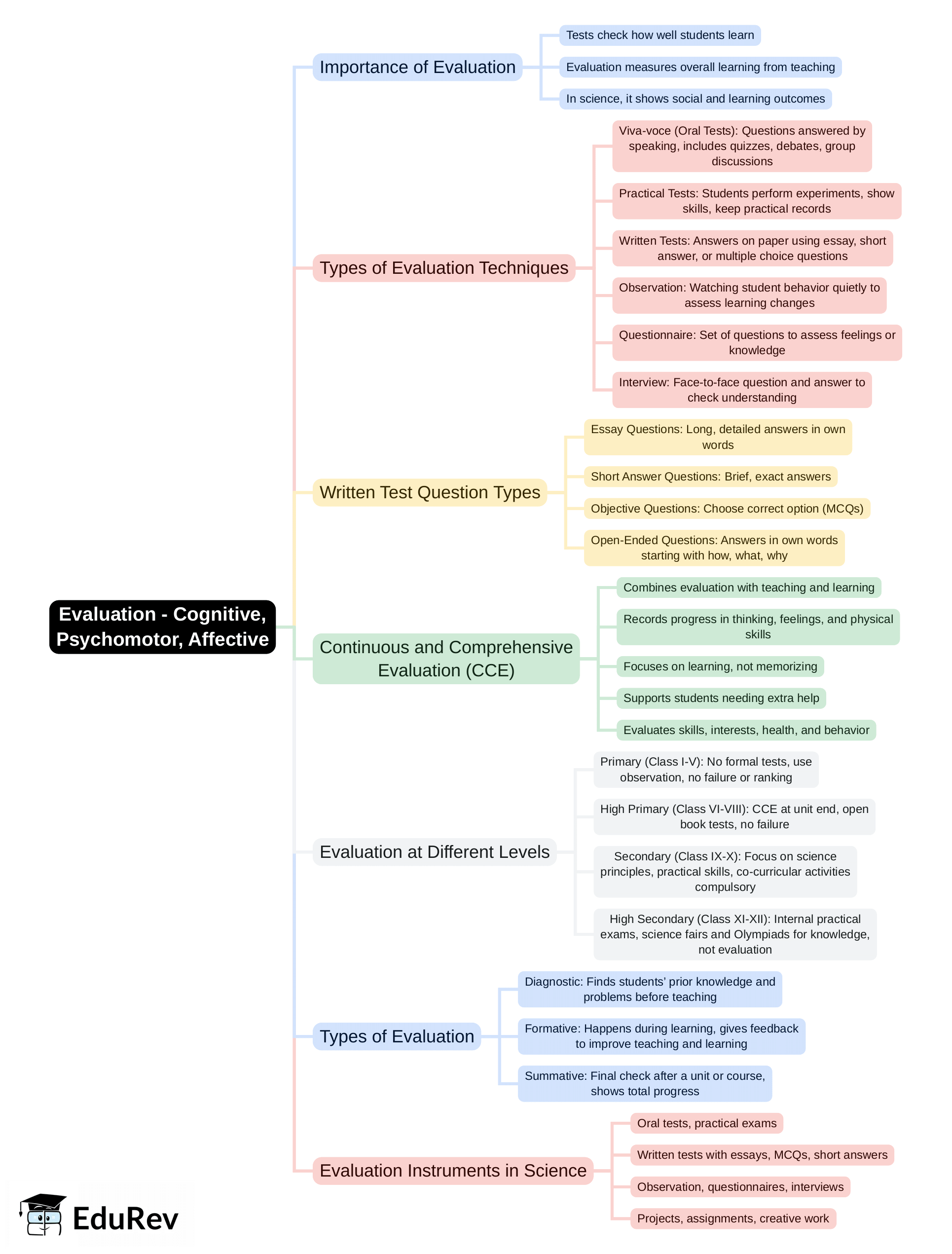CTET & State TET Exam > CTET & State TET Notes > Science & Pedagogy Paper 2 for CTET & TET Exams > Mind Map: Evaluation - Cognitive/Psychomotor/Affective
Mind Map: Evaluation - Cognitive/Psychomotor/Affective | Science & Pedagogy Paper 2 for CTET & TET Exams - CTET & State TET PDF Download

The document Mind Map: Evaluation - Cognitive/Psychomotor/Affective | Science & Pedagogy Paper 2 for CTET & TET Exams - CTET & State TET is a part of the CTET & State TET Course Science & Pedagogy Paper 2 for CTET & TET Exams.
All you need of CTET & State TET at this link: CTET & State TET
|
35 videos|145 docs|32 tests
|
FAQs on Mind Map: Evaluation - Cognitive/Psychomotor/Affective - Science & Pedagogy Paper 2 for CTET & TET Exams - CTET & State TET
| 1. What are the key components of cognitive, psychomotor, and affective evaluations in teacher eligibility tests? |  |
Ans. The key components of evaluations in teacher eligibility tests include cognitive evaluation, which assesses knowledge and understanding; psychomotor evaluation, which measures the ability to perform physical tasks and skills; and affective evaluation, which gauges attitudes, values, and emotional responses. Each component is crucial for ensuring that prospective teachers possess the necessary skills, knowledge, and disposition required for effective teaching.
| 2. How can teachers effectively prepare for the evaluation criteria in the CTET and State TET? |  |
Ans. Teachers can effectively prepare for the evaluation criteria by thoroughly understanding the syllabus and examination format, engaging in practice tests, and focusing on both subject knowledge and pedagogical skills. Additionally, participating in workshops or training sessions that emphasize cognitive, psychomotor, and affective dimensions can enhance their readiness for the evaluations.
| 3. Why is it important to assess the affective domain in teacher eligibility tests? |  |
Ans. Assessing the affective domain is important because it reflects a teacher's attitudes, values, and emotional responses towards teaching and learning. This domain influences how teachers interact with students, manage classrooms, and foster a positive learning environment. Understanding a teacher's disposition can be as vital as their knowledge and skills in predicting their effectiveness in the classroom.
| 4. What role does psychomotor evaluation play in the context of teaching practices? |  |
Ans. Psychomotor evaluation plays a significant role in assessing a teacher's ability to perform practical tasks and implement teaching strategies effectively. This includes skills such as classroom management, use of teaching aids, and the ability to engage students in hands-on learning activities. It ensures that teachers can translate their theoretical knowledge into practice, which is essential for delivering effective education.
| 5. How do cognitive, psychomotor, and affective evaluations interrelate in the context of teaching? |  |
Ans. Cognitive, psychomotor, and affective evaluations interrelate in teaching by providing a comprehensive view of a teacher's capabilities. Cognitive skills provide the knowledge base, psychomotor skills translate that knowledge into practice, and affective skills ensure that teachers approach their roles with the right attitudes and values. Together, these evaluations create a holistic picture of a teacher's readiness to educate and connect with students effectively.
Related Searches





















